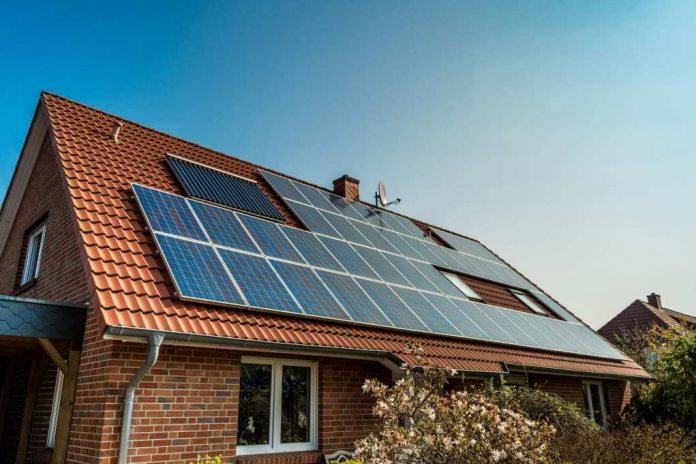
Solar energy has been gaining popularity over the recent years. Why is that? Well there are plenty of reasons. Solar panels are becoming less expensive to homeowners, are a source of renewable energy, could improve the home’s value, have government support, and don’t have high maintenance costs. Solar panels have plenty of advantages but there are disadvantages to be aware of as well.
What is a Solar Panel? How Do They Work?
A solar panel can be defined as a grid of wire, silicon, and glass that turns sunlight from the sun into a usable form of energy. It’s a pretty complicated process so bear with us! The sun naturally produces energy. This energy contains photons. When this photon rich energy (sunlight) hits the solar panel, it generates a current. This current is then inversely changed from DC to AC to make this current a form of usable energy. From there this usable energy becomes available to the consumer! Sometimes solar panels may produce too much energy for the home than what needs to be used. When this happens you can either sell or store the extra energy.
Advantages of Solar Panels
Homeowners have plenty of reasons to have their home go solar:
More Affordable Electricity Bills
Solar energy could save you more money than you may realize. There are factors that impact the amount that you could save. The size of your home, how much electricity you use, and the location of your home are just to name a few. There are free online tools that you can use that can help you see what your potential savings are when you install solar panels.
Tax Benefits
Both state governments and the federal government offer tax benefits for homeowners that choose to install solar panels. Some homeowners could claim 30% of installation costs during tax time! However, this varies by state so be sure to see what the local laws are as well.
Improve the Economy
Homeowners can take pride when they go solar because they could end up helping the economy overall. When consumers want a solar installation, they provide more jobs to people. When there is a higher employment rate, the economy can feel those positive effects.
Be an Energy Independent Homeowner
There are many sources of energy. One benefit of solar energy is the fact that it is an infinite source! Coal and natural gas are a different story. That is why when you go solar, you reduce your reliance on foreign oil and fossil fuels. This can provide an energy bill that is more consistent especially when there are issues with other forms of energy.
Longevity and Easy to Maintain
Every solar panel installation is different depending on the system. Generally, you can expect your system to last at least 20 years. The best part? These systems require very little maintenance. The company that installs your solar panels will provide you information specifically about the longevity and system maintenance requirements.
Improve Your Carbon Footprint
One nice benefit of solar energy is the fact that power can be generated without any potentially dangerous emissions. Solar energy doesn’t emit any greenhouse gasses, is clean, and free of pollutants. On average, a typical home in America produces 14,920 pounds of carbon dioxide annually. The average household solar panel system is five-kilowatts. For every one kilowatt installed, you could reduce the carbon footprint of your home by 3,000 every year. That means one system could potentially reduce 15,000 pounds of carbon dioxide per year!
Disadvantages of Solar Panels
Just as there are advantages to going solar, there are also some disadvantages:
Expensive Upfront
While one advantage is the lower monthly energy bill, you will still have to deal with the high upfront costs. The equipment, the panels, the installation, and the type of current can have an impact on the initial cost. These costs on average can be anywhere from $17,760 to $23,828.
Location Can Play an Important Role
The location of your home will play a role because of the weather. If you live in areas that are relatively shady then that could negatively impact how well the system works. If you live in a predominantly sunny area, that is a different story. The sunnier climate you live in, then the better your solar system will work.
Immobile
While it may technically be possible to move your solar panel system when you move, it’s not advised. It’s not advised because the moving process can cause a lot of damage to the original roof as well as the system itself. That means that the home you install it on will be the home that it stays with. If you plan on moving, you should find your break even point to see if the upfront costs are worth the amount of savings and value added to the home.
Could Be Hard to Find Coverage
The solar panel industry is growing. However, there still may be areas that a company doesn’t cover. If you live in one of those specific locations, you may be limited in your energy options. It can also be difficult for those living in rural areas or those that live far away from their solar provider because it could take a while to get to the property if there are any issues.
Not a Good Fit for Limited Space
A solar panel system needs a lot of room. Think of it like a big dog that needs a yard to play in. You wouldn’t want a great dane in a studio apartment. The same concept applies here. That is why properties typically located in inner cities, may not have enough room for a sufficient solar setup.
Overall
There are both pros and cons when it comes to going solar. There are plenty of factors to consider when making this decision. It can also help you to find your break even point. This can show you how long it would take in savings and value added to the property to overcome the initial high upfront costs. It is important to be aware of both the pros and cons so you can make an educated decision as to whether or not this is a system that you would like for your home.




























